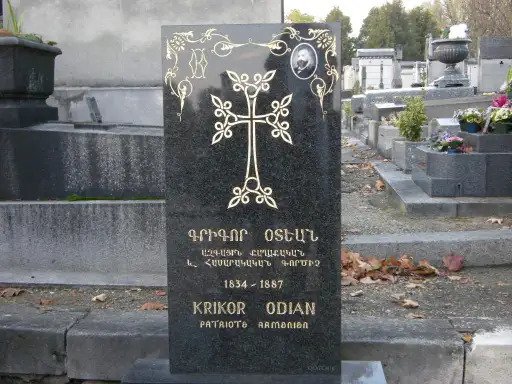Death of Krikor Odian (August 6, 1887)

Krikor Odian was born on December 9, 1834, in Scutari (Constantinople). His father was the secretary of palace architect Krikor Balian. After his early schooling with his father, he continued his studies with brothers Kapriel and Khachadur Bardizbanian. Later, he attended the private school of Gabriel Utujian, who would soon become the founding editor of the influential newspaper Masis. He also took private lessons of Ottoman Turkish and French.
In the 1850s, Odian moved in the circles of Armenian reformist intellectuals. He soon developed his own ideas for cultural and political reform. His first works were related to the reform of the Armenian language, which was in the transition between Classical and Modern Armenian. He wrote his first book, Proposal for the Modern Armenian Language, at the age of seventeen, followed by a Grammar of the Modern Armenian Language (1853), written along with Nahabed Rusinian. His interest in language reform was matched by his ideas for political reform. He took over different tasks in the administration of the Armenian millet (community). He played an outstanding role in the process leading to the promulgation of the Armenian National Constitution of 1863.
In 1854 Odian had entered the Ottoman state administration, quickly ascending through the ranks. He became director of political affairs in the administration of Midhat Pasha, then governor of the Danube Province, from 1864–1866 in Ruschuk (nowadays Ruse), Bulgaria.
In 1876, he was appointed to the Ottoman State Council with the rank of bala (highest Ottoman civil rank). In the same year, after Midhat Pasha became Grand Vizier (1876-1878), he was a member of the committee that drafted the Ottoman Constitution promulgated in December 1876. After the Russo–Turkish broke out in 1877, Odian acted as advisor for Nerses Varjabedian, Armenian Patriarch of Constantinople. He authored the memorandum submitted to the Congress of Berlin by the Armenian delegation in 1878.
After the suspension of the Ottoman Constitution in early 1878 and the ousting of Midhat Pasha by Sultan Abdul Hamid II, Odian feared that he would be persecuted and fled Constantinople in 1880. He settled in Paris, following the French parliamentary debates and contributing to the press. Despite Abdul Hamid’s attempts to induce him to return to the Ottoman Empire, Odian preferred to remain in exile. He passed away in Paris on August 6, 1887, and was buried in the Père Lachaise cemeter
